
"[Am I The Jerk] For Refusing To Pay For My MIL’s Broken Phone Screen After My Toddler Threw It?"
Picture this: You hand your phone to a toddler— what could possibly go wrong? You’ve probably been there, or maybe you haven’t, but we all know toddlers can be human wrecking balls with adorable faces.
Today’s Original Poster (OP) found themselves in a rather messy situation involving their 18-month-old, a cracked phone screen, and a mother-in-law who wasn’t thrilled about footing a repair bill. The twist? The mother-in-law was the one who handed over the phone to the toddler in the first place.
More info: Reddit
Giving your phone to a toddler is basically saying goodbye to your screen and hello to chaos
Image credits: George Pak / Pexels (not the actual photo)
The author’s mother-in-law was babysitting their child and gave the 18-month-old her phone, but when she was done, the little one threw it to the floor
Image credits: Super_Spud_Eire
Image credits: vecstock / Pexels (not the actual photo)
The screen of her phone was shattered, and the mother-in-law demanded that the author and her partner pay for the damage
Image credits: Super_Spud_Eire
Image credits: Kaboompics.com / Pexels (not the actual photo)
The author gave the mother-in-law reasons as to why they can’t pay for the damage, but she wasn’t happy about it
Image credits: Super_Spud_Eire
They finally asked the mother-in-law to pay for the damage while they pay back in installments, but she said it was their problem
The OP’s 18-month-old was being watched by the mother-in-law for a bit. She took a chance and handed over her phone to the toddler so she could enjoy some YouTube time. If you’ve ever given a phone to a little one, you know how quickly things can escalate.
The toddler, naturally, got bored and threw the phone from the high chair, leading to a shattered screen. Now, no one can argue that toddlers don’t make questionable decisions—they’ll eat dirt, chew on electrical cords, and apparently, launch phones into oblivion.
The mother-in-law, who’s doing quite well financially, demanded that the OP and her partner foot the repair bill, which was no small amount. To make matters worse, this was right before Christmas, and for the parents, that repair cost would be a significant burden.
It’s important to note that the couple doesn’t allow their child to use phones in the first place, and the mother-in-law knew this when she made the decision to hand over her device. Now, the OP had some strong points in their defense.
First, they weren’t there when the incident occurred. Second, they were not the ones who gave the phone to the toddler. And third, there’s the money issue. For the mother-in-law, it would be a drop in the bucket, but for the parents, it means scraping together extra cash they don’t have.
Despite all of this, she wasn’t willing to compromise. The OP and her partner offered to pay her back in installments, but she refused, claiming that it was their responsibility to handle the situation.
Image credits: Kaboompics.com / Pexels (not the actual photo)
The OP and her partner did a good job by trying to negotiate on the payment. According to Stitt Feld Handy Group, conversations with family can be often frustrating, so it is essential to be able to discuss and negotiate effectively to resolve conflict.
Therefore, the keys to having seamless conversations and reaching satisfying conclusions include entering the discussion with the goal of finding a workable solution for everyone as well as “keeping emotions in check” and “active listening”.
Research from Greater Good reveals that wealth can significantly impact how people think, feel, and behave, often without them realizing it. Wealthier individuals may struggle with empathy and compassion, while those with fewer resources tend to develop greater emotional intelligence due to their need for social support and understanding.
Take the mother-in-law, for example: her wealth might be influencing her inability to empathize with the OP and her partner’s financial strain. They go further to highlight that wealth can also cloud moral judgment, which could have led her to feel entitled to have the phone repaired without considering the situation.
The majority of commenters strongly agreed that the OP was not at fault, with many emphasizing that the mother-in-law’s decision to hand over an expensive phone to an 18-month-old was quite reckless.
However, a few netizens suggested that while the mother-in-law made a mistake, the OP and her partner should consider offering to pay a portion of the repair cost as the mother-in-law also did them a favor by babysitting their child.
What would you do if you were in the OP’s shoes? Would you pay for the repair or stand your ground? Please let us know your thoughts!
The general consensus from netizens is that the mother-in-law should not have given a baby her phone in the first place
I don't even have kids and I know that toddlers throw things. MIL is out of line here for sure.
"Play stupid games, win stupid prizes." Is this MIL's first time around a toddler?/s If MIL can't figure out "don't give expensive stuff to a toddler who will throw it" she deserves a broken phone.
I love seeing people post "play stupid games, win stupid prizes", this should be a national ad campaign.
Load More Replies...Point 3 is irrelevant, legally. However, if one is babysitting and does something negligent, they bear the responsibility, particularly if they are aware (although that's harder to prove) that they shouldn't have done it.
I don't even have kids and I know that toddlers throw things. MIL is out of line here for sure.
"Play stupid games, win stupid prizes." Is this MIL's first time around a toddler?/s If MIL can't figure out "don't give expensive stuff to a toddler who will throw it" she deserves a broken phone.
I love seeing people post "play stupid games, win stupid prizes", this should be a national ad campaign.
Load More Replies...Point 3 is irrelevant, legally. However, if one is babysitting and does something negligent, they bear the responsibility, particularly if they are aware (although that's harder to prove) that they shouldn't have done it.

 Dark Mode
Dark Mode 

 No fees, cancel anytime
No fees, cancel anytime 



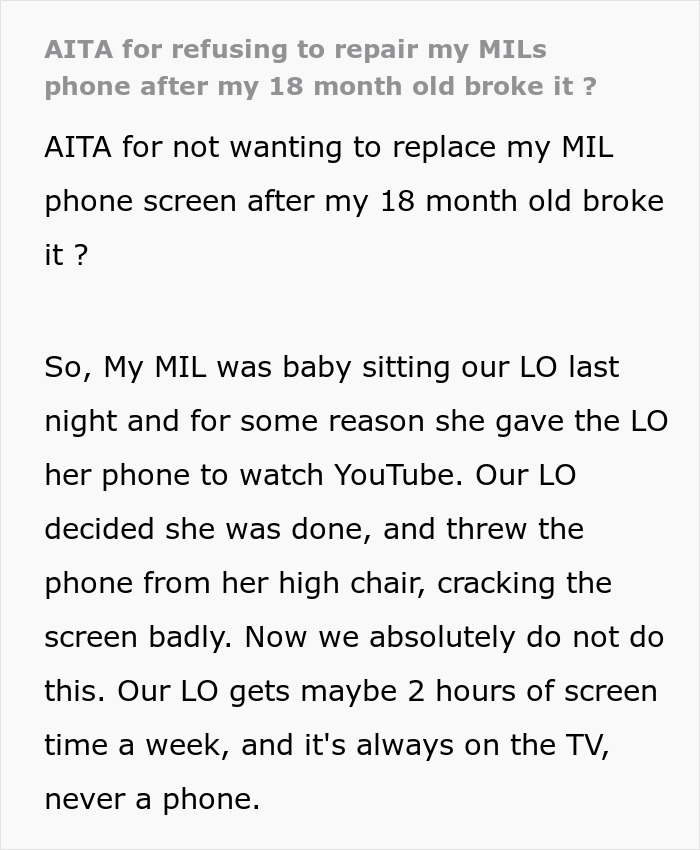
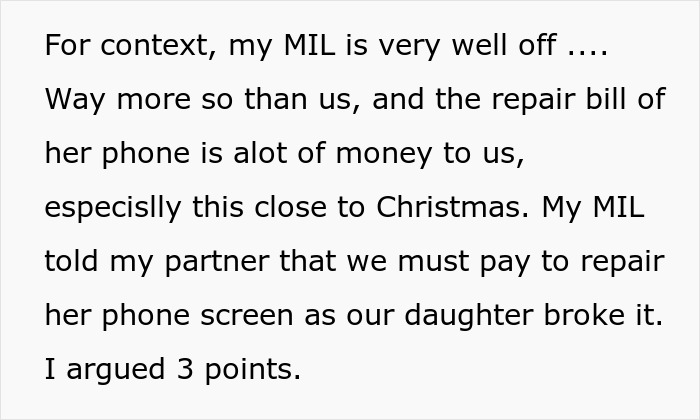


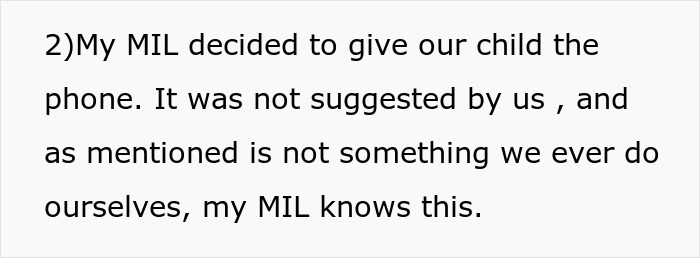


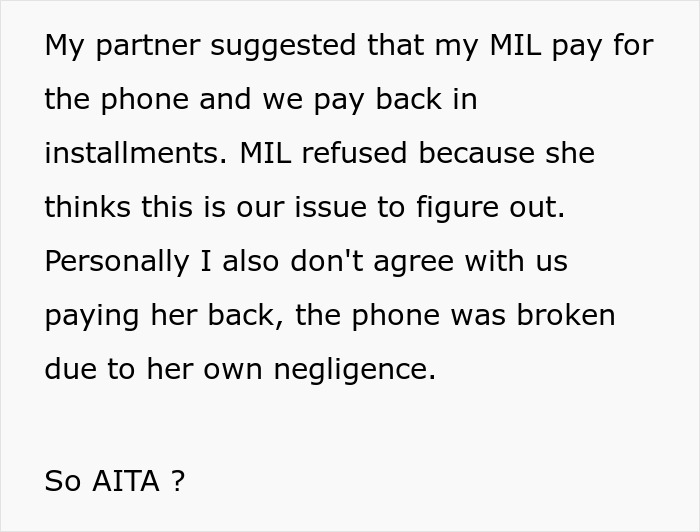


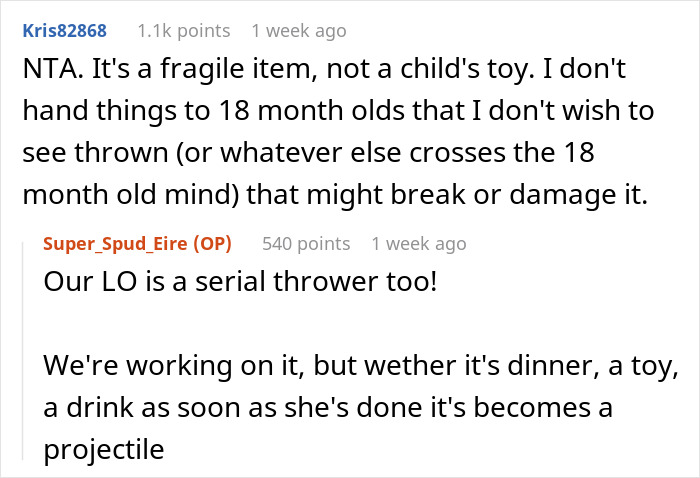


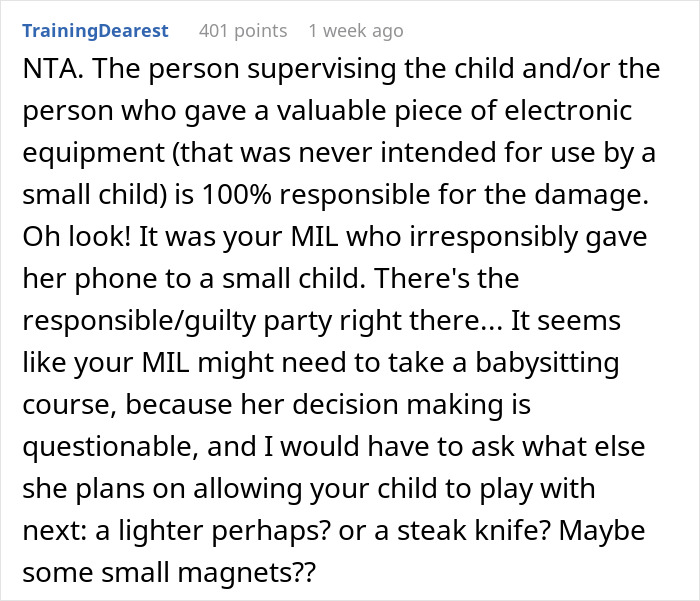

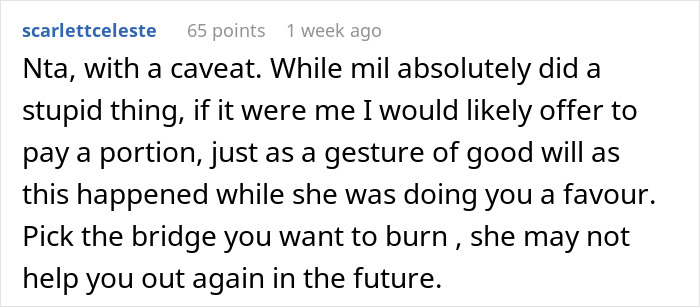




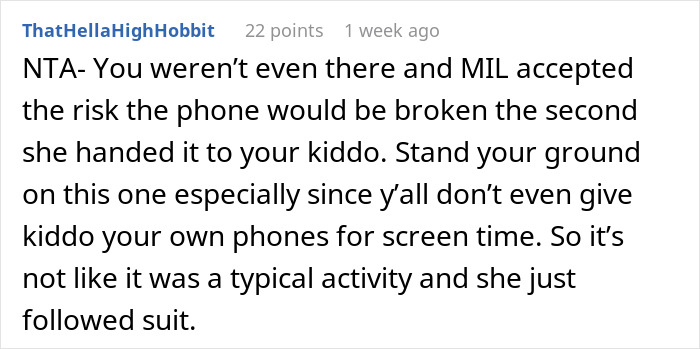




























26
27